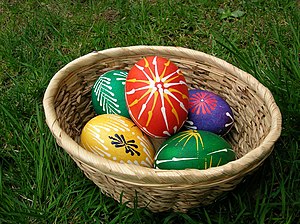 Easter eggs (Photo credit: Wikipedia)
Easter eggs (Photo credit: Wikipedia)By Renee Goodrich
Easter is an ancient holiday that is celebrated in many countries. For Christians, it is the commemoration of the death and rebirth of Jesus Christ. However, Easter has deep roots and traditions that go back well before Christianity (which is 2000 years old).
The word Easter comes from Eostre, the ancient Germanic goddess of spring (popular from the 6th century BC). Eostre found a colorful bird that was too injured to be able to fly again, so she turned it into a rabbit. Amazingly, the rabbit kept the ability to lay eggs. To say thank you, the rabbit gave Eostre a basket of her colorful eggs as a gift. In kind, followers of Eostre honored spring with gifts of colorful bird eggs. This tradition spread throughout Europe and did not change until the mid 1800's when European manufacturers began to produce chocolate eggs. The chocolate was very popular and the custom evolved, so that today it is common to give baskets of chocolate Easter eggs. Migrants to the United States, Australia and other countries brought the folk tale and tradition with them.
If you look even further back than the legend of Eostre, you can find plenty evidence of ancient cultures decorating and giving eggs in Spring. For more than 3000 years, the Chinese have been painting eggs red for spring festivals, the Zorastrians (Middle East - 2500 years ago) offered colored eggs on their New Year's Eve which is at the start of spring, and the Druids (Western Europe - 6000 years ago) used them in ceremonies held on the spring equinox (when day and night are of equal length). Incredibly, a large stash of 60, 000 year old ostrich egg shells found at Diepkloof Rock Shelter in South Africa had detailed patterns scratched onto them.
Today, Easter is celebrated in many countries, in many ways.
- In Eastern Europe people use wax and dye to create detailed designs on hard-boiled eggs.
- In the Netherlands and Germany Easter fires are lit at sunset on Easter Sunday.
- In Bermuda kites are flown.
- In Nordic countries, the Easter holiday is associated with murder mysteries. Major TV stations run crime and detective marathons and publishing houses release novels just before Easter.
- In Finland, Sweden and Denmark small children dress as witches and go door-to-door collecting chocolate eggs.
- In Switzerland (the land of cuckoo clocks) the cuckoo brings the eggs.
- In Westphalia (a region of Germany) a fox brings the eggs.
- In the United Kingdom egg knocking competitions are held. Competitors line up and knock eggs together. If an egg is cracked the competitor is out.
- In the United States of America, an Easter Party for children is hosted by the President. A highlight of this event is the egg rolling race.
- In Australia people also give Chocolate Easter Bilbies. The bilby is an endangered native Australian mammal that looks similar to a rabbit. Some of the proceeds of each sale go to the protection of endangered species.
- In France, children throw eggs in the air and catch them. If you drop your egg you're out.
- In Egypt, Easter Monday is a public holiday that marks an ancient spring festival. Egyptians spend the day in parks and gardens.
- In Florence, Italy an enormous 300 year old cart that is decorated with flowers is dragged through the streets. At the end of its journey, it is bombarded with fireworks and explosions to ensure a good harvest for the year.
However, in most countries that celebrate Easter, two customs are honored; people give decorated or chocolate eggs as gifts and children hunt for hidden eggs.
For a classroom ready A4 size printable version of this article and other Easter printables for your primary/elementary students head to http://www.free-teacher-worksheets.com/easter-printables.html
Article Source: http://EzineArticles.com/?expert=Renee_Goodrich
http://EzineArticles.com/?Why-Do-We-Celebrate-Easter?&id=3878743
